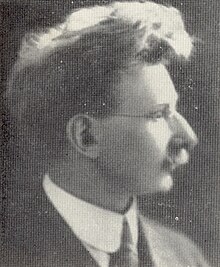Hans Pöögelmann

Hans Pöögelmann (30 December 1875 Aidu Parish, Viljandi County – 27 January 1938, Moscow) was an Estonian communist politician, economist and poet. He was a member of Estonian Provincial Assembly and a leading figure of the Estonian Labour Commune.[1]
Biography[]
Pöögelmann was born in a farmers family. After his graduation, he started to work as a teacher and later as journalist in newspapers such as Postimees. He continued his studies in Leipzig, where he became a committed Marxist and joined the Russian Social Democratic Labour Party in 1905. In 1907, he participated in the Terijoki Conference of Estonian Organizations in Finland, where he was elected chair of the conference. He was arrested arrested in 1909 and sent to Siberia.
In 1911, He fled from there to New York, USA. There he worked as the editor of the newspaper Uus Ilm until 1917.[2]
Pöögelmann returned to Russia after the February Revolution and became a member of the Tallinn City Council and the Estonian Provincial Assembly. After the October Revolution and the establishment of the Commune of the Working People of Estonia he was appointed Commissioner of the National Economy.
After the fall of the Commune he traveled to Soviet Russia and became head of the Estonian section of the People's Commissariat of Nationalities. Pöögelmann was among the founders of the Communist International and was later elected to its Executive Committee. He was a delegate in 1st-6th Congresses of the Comintern.
He was a professor at the Communist University of the National Minorities of the West and Herzen University. Pöögelmann was a member of the Central Committee of the Communist Party of Estonia and edited various of its publications. Pöögelmann was also the writer of many works on economy and the workers' movement in Estonia.[2]
Pöögelmann was arrested during the Great Purge and was sentenced to death for anti-Soviet activities.[1]
Pöögelmann was rehabilitated by the Soviet government posthumously. Several streets and schools were named after him during the Estonian Soviet Socialist Republic including a bronze bust in Tallinn which was later removed in 1992.[3]
Poetry[]
In 1898, in his poem "Sonnets on the Ruins of Viljandi Castle" ( Est. "Sonetid Viljandi lossivaremetel" ) predicted the coming of new times for Estonia. In various publications he published poetry under the pseudonym H. Rooskaja, including such poems as "I throw logs" ("Puid pillun", 1900 ), "Spring winds" ("Kevadetuuled", 1904 ), "Snowdrifts" ("Hanged", 1904. A collection of his satirical poems "Rough Sketches" was published in 1910. The best of his poems in 1925were published as a separate collection called "Spring Winds" ("Kevadetuuled"). In 1936 he published a collection of his poems "To those who fell in the fight for brothers."[4]
Pöögelmann translated The Internationale and La Marseillaise into Estonian.
References[]
- ^ Jump up to: a b "Eestimaa kubermangu ajutise maanõukogu liikmed". nlib.ee (National Library of Estonia) (in Estonian). Archived from the original on 26 April 2018. Retrieved 28 February 2021.
- ^ Jump up to: a b "Пегельман Ганс Густавович". hrono.ru. Retrieved 2021-07-23.
- ^ "Pitka ausammas tuleb Pöögelmanni alusele". Postimees (in Estonian). 2001-01-16. Retrieved 2021-07-25.
- ^ "Пегельман // Литературная энциклопедия. Т. 8. — 1934 (текст)". feb-web.ru. Retrieved 2021-07-25.
- 1875 births
- 1938 deaths
- Members of the Estonian Provincial Assembly
- Estonian communists
- Estonian poets
- Estonian economists
- Old Bolsheviks
- Russian Social Democratic Labour Party members
- Marxian economists
- People from the Governorate of Livonia
- Great Purge victims from Estonia
- Soviet rehabilitations
- Executive Committee of the Communist International